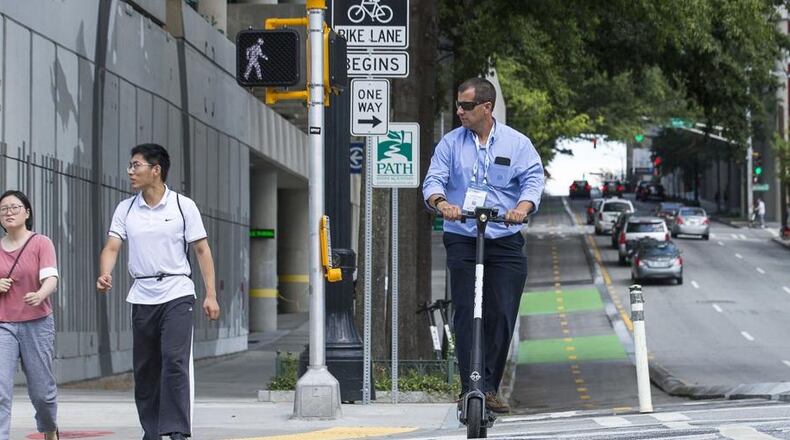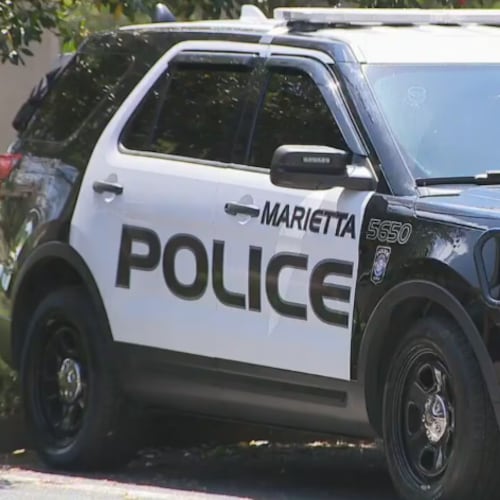People in Atlanta spent more than $16 million to take trips on shareable electric scooters and bicycles last year, as the average cost to take a ride steadily increased.
A common sight on city streets and sidewalks, e-scooters first won over fans with their affordability and convenience for darting around town. But some believe the rising cost to rent them could make them less popular for routine transportation, and that the city's stiff regulations and fees imposed on the scooter companies may be to blame.
A report recently released by the city of Atlanta provides the most comprehensive look yet at the price for e-scooter trips in Atlanta — and how residents used them — from February to December 2019, the first 11 months that the booming industry was regulated by the city.
Riders took about 4,385,000 rides on electric scooters and bikes last year, according to the report, which is based on monthly data submitted to the city by the scooter companies, which include Bird, Lime and Uber. But the average cost per trip nearly doubled over the course of 2019 — from $2.87 in February to $5.07 in December — while the average length of a ride hovered around 1 mile and 10 to 15 minutes.
Credit: Nick Thieme/AJC
Credit: Nick Thieme/AJC
Thousands of e-scooters were first placed along the city's streets about a year and a half ago. While some complained the scooters were an unsafe nuisance "littering" streets and sidewalks, others saw the "micromobility" option as the future. The companies pitched that e-scooter rides replace car trips or complement MARTA rides.
The increased financial burden on riders, however, may hinder that long-term vision, experts said. Some people have even turned to purchasing their own electric scooters instead of relying on daily rentals.
“Right now, they’re becoming too expensive,” said Chris Wyczalkowski, a Georgia State University researcher studying the impact of e-scooters in Atlanta. “At $5 a trip, that’s no longer a mode that you can use on a daily basis to replace your car commute.”
The city’s data includes shareable e-scooters, e-bikes and seated scooters from companies like Wheels. According to city records, scooter companies operated the majority of the devices permitted last year.
Credit: Nick Thieme/AJC
Credit: Nick Thieme/AJC
Ridership in Atlanta reached its peak last July, when users took 608,000 rides over 780,000 miles, according to the report. With an average cost of $4.48 per ride in July, people poured about $2.7 million into the micromobility economy that month.
Over the rest of the year, scooter use dropped, with 116,000 rides in December. There are several possible reasons behind that dip, Wyczalkowski said. For one, it got colder outside. The end of 2019 also marked the departure of several major operators from the Atlanta area.
In September, Uber announced it was pulling its JUMP e-bikes out of Atlanta, though the company continues to offer e-scooters here. In November, Lyft announced the end of its scooter operation in Atlanta. Lime faced a similar fate in early January.
Meanwhile, riders are paying more per trip. When Bird and Lime first landed in Atlanta, each ride was $1 to start plus 15 cents per minute. Now, according to the Bird app, a ride can cost $1 to start and up to 49 cents per minute.
“Riding a scooter 1 mile costs more than a MARTA trip. Cost is a huge factor in this thing,” Wyczalkowski said. The regular one-way MARTA fare is $2.50.
At the time Lime left Atlanta, a ride cost a dollar to start and 29 cents per minute. A year ago, Uber’s JUMP scooters cost $1 to unlock and 10 cents per minute. Now, there is no cost to unlock a JUMP device, but they cost 25 cents per minute.
The price of e-scooter rentals partly led John Doane to purchase his own scooter for $300. Faced with a steep price for parking on campus at Georgia Tech, the engineering professor figured e-scooters could be a better alternative to get around.
For a while, Doane used Bird or Lime rentals to get between the two labs he works in. Then he realized those incremental costs might add up, and that rental scooters might not always be available where he needs them. After doing the math, the decision was clear.
“I had figured that about six months’ worth of what I was doing would have cost me in rental fees the amount that I could have used to just purchase one,” he said. “The price for the scooter is pretty good and it pays off pretty quickly.”
An Uber spokeswoman said the company is “always evaluating pricing as we work to offer residents this affordable option to get from A to B.” Bird offers a program providing discounts to low-income users who are enrolled or eligible for a government assistance program.
Wyczalkowski pointed out that the tech startups dominating the scooter industry are still relatively new and trying to make a profit, and said the regulations and fees in Atlanta may be leading them to increase their prices.
When Lime announced it was leaving Atlanta in January, the company cited the city’s high impound fees and nighttime ban on operating the devices as reasons for departing.
A spokesman for the city did not respond to requests for comment about the concerns over pricing. But legislation currently being considered by the city would partly address those worries, by requiring companies to offer discounted price options for some users. The proposed ordinance, which could be passed Monday, would come with a number of other strict new requirements for the companies.
In a blog post last month explaining why Lime was leaving Atlanta and 11 other cities, Lime CEO Brad Bao said the company was shifting its "primary focus" to turn a profit. There are "select communities throughout the world," Bao wrote, "where micromobility has evolved more slowly."
Staff reporter Raisa Habersham contributed to this report.
About the Author
Keep Reading
The Latest
Featured







